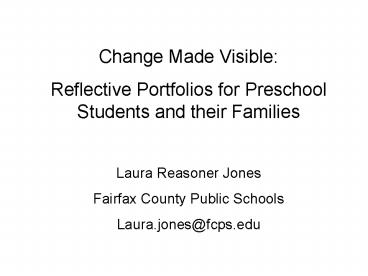Change Made Visible: - PowerPoint PPT Presentation
1 / 34
Title:
Change Made Visible:
Description:
Action Research is the process by which practitioners attempt to study their ... One child said 'No' emphatically when asked, 'Everyone understands me' ... – PowerPoint PPT presentation
Number of Views:43
Avg rating:3.0/5.0
Title: Change Made Visible:
1
Change Made Visible Reflective Portfolios for
Preschool Students and their Families Laura
Reasoner Jones Fairfax County Public
Schools Laura.jones_at_fcps.edu
2
Action Research is the process by which
practitioners attempt to study their problems
scientifically in order to guide, correct, and
evaluate their decisions and actions. Stephen
Corey (1953)
3
My question What happens when a teacher
documents the entire year in photographs and uses
these to inspire reflection and self-evaluation
in students and parents?
4
- Context
- Preschoolers with developmental delays
- Speech/Language Impairment
- Social anxiety
- Fine motor delays
- Weekly home visits to address IEP goals
5
- Research on portfolios and young children
- Wright and Borland, 1993used portfolios to
identify young gifted children from disadvantaged
backgrounds - 2. Morrison, 1999used portfolios to support
inclusion, to enhance acceptance and celebrate
accomplishments
6
3. Campbell, Milbourne and Silverman,
2001created strengths-based portfolios to alter
perspectives of caregivers of children with
special needs 4. Kankaaranta, 1996used
portfolios to reflect individual growth and
self-knowledge in young children
7
5. Smith, 2000Used portfolios to increase
reflection about work and development and to
increase parent participation 6. Grubb and
Courtney, 1996Demonstrated growth over time,
learned self-evaluation and how to set goals
8
- Purposes
- Develop and examine weekly reflection tool for
students and parents - Examine self-perception surveys
- Examine parent-perception surveys
- Increase parent involvement in student learning
9
Weekly reflection tool Develop parent response
and accountability for family regarding IEP
goals Determine how perceptions of child change
over time with use of digital pictures and
periodic reflection together
10
(No Transcript)
11
Parent survey
12
Child Survey
13
- Weekly Reflection Tool
- Children generally very accurate when reflecting
on own progress - If work was hard or easy, parent generally
agreed. - Children and parents could indicate words were
hard because they did not practice--accountabili
ty
14
(No Transcript)
15
(No Transcript)
16
(No Transcript)
17
- Weekly Reflection Tool Conclusion
- Gave us, the parents, the children and the
teacher, a place to discuss, document, and
reinforce practice - Made us into a team
- Encouraged weekly reflection
18
- Collections of
- Work samples-journals, drawings
- Taped language samples
- Videos
- Photos taken during home visits
- Pre and Post Surveys of Perceptions of child
19
Year OneChildren Most changes were seen in
Everyone understands what I say. More
negative answers, more realistic
self-perceptions. Some positive and negative
changes in I like school.
20
(No Transcript)
21
(No Transcript)
22
Year OneParents Most more positive about
childrens abilities and strengths Most more
realistic in speech and motor concerns Over the
year parents have learned more about normal
development and can more accurately describe
child.
23
(No Transcript)
24
Year TwoChildren Most children moved to more
positive self-perception Speech Delays One
child said No emphatically when asked,
Everyone understands me
25
Another said sort of in answer to this, and
then yes, but I talk too fast, after nine
months of speech and fine motor work. We also see
that he is beginning to realize the challenges
that fine motor tasks have for him.
26
(No Transcript)
27
Year TwoParents Parents again are generally more
positive, but more realistic about their childs
progress.
28
(No Transcript)
29
Comparisons over two years I saw three of these
children for two years. In general, children and
parents became more accurate. Strengths grew more
apparent, as did weak areas. Childrens self
perception became even more accurate the second
year.
30
(No Transcript)
31
(No Transcript)
32
(No Transcript)
33
Why make portfolios?
34
- To show skill development
- Learning to solve problems
- Learning to make patterns
- Learning to try new things































